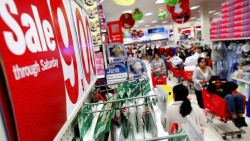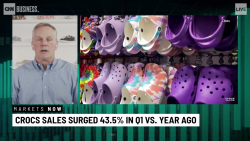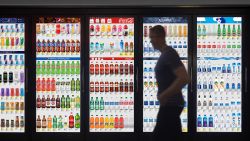One of Britain’s biggest supermarket chains is closing its meat, fish and deli counters permanently as the coronavirus pandemic accelerates changes in shopping habits.
Sainsbury’s said in a statement on Thursday that closing these counters will make stores simpler to run and reduce food waste. It will continue to offer hot food, including pizza, as well as patisserie and some bakery services in stores. “The pandemic has accelerated a change in our customers’ shopping habits and we are adapting to meet those needs,” a spokesperson told CNN Business.
Fewer customers are doing big shops in stores. Instead, they’re loading up their online carts and heading to nearby locations for day-to-day items. The average online basket size increased 17% in the 28 weeks to September 19 compared with the same period a year earlier, Sainsbury’s CEO Simon Roberts said on an earnings call.
“The accelerated shift online will not reverse,” he added.
Sainsbury’s has doubled its online capacity since the start of the pandemic, delivering more than 700,000 grocery orders a week. It is fulfilling 100,000 click-and-collect orders per week, eight times more than pre-covid levels, and 17% of grocery sales are now online, compared with 7% back in March before the pandemic hit.
The “rapid shift to digital” is expected to stick “regardless of how long Covid is with us,” Roberts said.
Grocery store chains in the United Kingdom and the United States are rapidly adjusting their business models to adapt to what they view as lasting changes to the way that people buy food.
US supermarkets, including Kroger (KR), Amazon (AMZN)-owned Whole Foods and Walmart-owned Sam’s Club, have expanded their pickup offerings to meet a surge in customer demand.
Sainsbury’s rival, Marks & Spencer, said Wednesday that it has “brought forward three years change in one” to become a more digital business. The company said that its deal last year with Ocado will enable it “to take advantage of the long-term opportunity created by the step change in online grocery shopping in the UK.”
Ocado (OCDDY), which is helping Koger automate deliveries, announced earlier this week that it has bought two US-based robotics companies to help develop technology to pick and pack online orders. “The robotic pick opportunity in online grocery is of huge value to us and our clients globally,” Ocado (OCDDY) Group CEO Tim Steiner said in a statement.
While far greater numbers of shoppers are buying their groceries online, those who do go into stores want to shop as close to home as possible, according to Roberts. Sales in neighborhood stores are up 15%.
As millions of people in Britain continue to work from home, some city dwellers have decided to move into the suburbs in the anticipation that they won’t need to commute into central offices as much even after the pandemic ends.
Sainsbury’s said it plans to open more “neighborhood hubs,” which are larger than typical convenience stores and offer locally-tailored products. It will also increase the rate of new convenience store openings and produce more fresh food to go on site, such as hot meals, sushi, freshly baked bread and hot coffee.





















